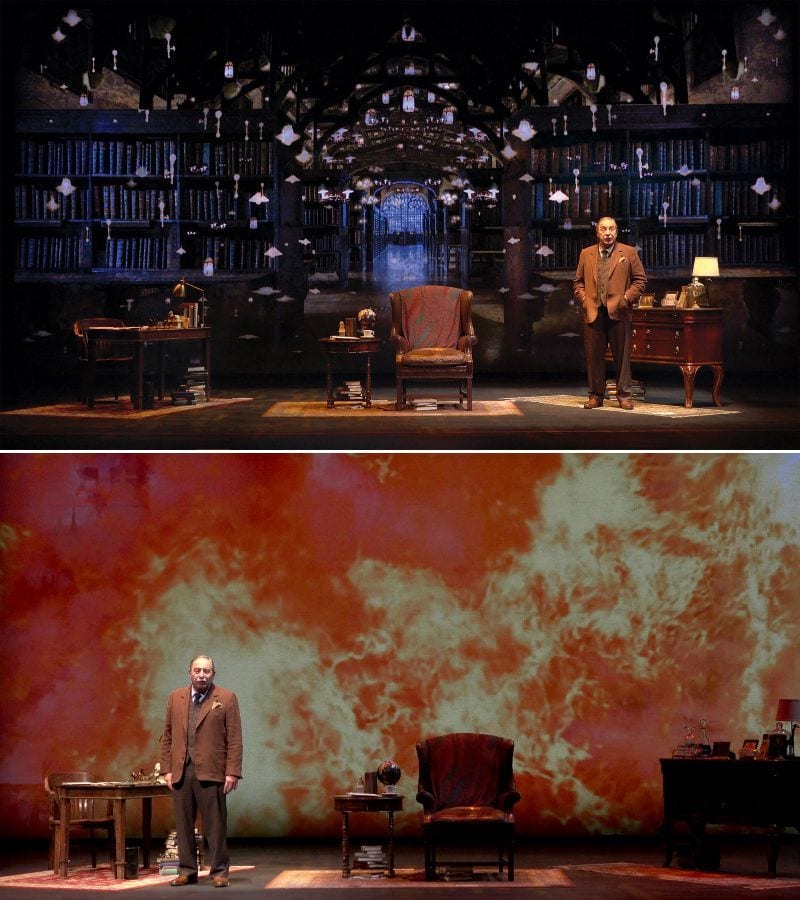In the guise of a visually spectacular and aurally lush bio play about the British author C.S. Lewis (he of the Narnia books et al.), writer and solo performer Max McLean achieves a most uncanny theatrical effect: He literally takes our brains along on the path of logic and rationality by which Lewis deduced the divine. Although an avowed atheist in his youth, Lewis famously became, during his tenure as a lit prof at Oxford and Cambridge, one of the world’s most cerebral and influential proponents of Christianity — a religion in which, he said, mystery, history, and moral law uniquely meet. No luminous revelation or soulful sentimentality for him, no life-altering road-to-Damascus moment. Quite simply and singularly, Lewis came to faith by cogitation. And that personal process is the fascinating through-line of C.S. Lewis on Stage: Further Up & Further In.

Now at the Klein Theatre until June 18, C.S. Lewis on Stage: Further Up & Further In is a touring presentation by Fellowship for Performing Arts, a New York City–based nonprofit “producing theatre and film from a Christian worldview to engage a diverse audience.” FPA regularly performs in DC (see links below to my reviews of previous shows), and Further Up & Further In is the sequel to The Reluctant Convert (seen here in 2018). All the FPA productions I’ve seen, including this one, are uniformly top-tier.
The set by Kelly James Tighe evokes an ivory tower study — a bookish desk, a leather reading chair, a table with port — and lighting by Geoffrey D. Fishburn isolates clarifying pools into which McLean as Lewis crosses. But behind him is a stage-wide video wall on which appear Harry Feiner’s awesome projections of splatter-paint animations and intergalactic visions and surreal scene-setting photomontages timed to a gorgeous sound design of celestial original music by John Gromada. The image of a brainy don interrogating the universe to the music of the spheres was unmistakable.
McLean’s script starts with a grabber. Without so much as a howdy, his Lewis launches into a monologue about the difference between two polar opposite ways of understanding existence.
Ever since we humans have been able to think, we have wondered what this universe is and how it came to be. Roughly two views have held to give us an approximate answer. There is the materialist view, and there is the religious view.
As Lewis explains very clearly (“I suffer from incurable intellectualism,” he says at one point), the materialist view is all about the stuff, the atoms, the mass, the force, and such; whereas the religious view is all about the divine design, intentional creation, meaning and purpose beyond the material — another world, as Lewis conjectures, “further up and further in.” So riveted are our minds by Lewis’ elegant ratiocination — as expressed in McLean’s transfixing inflection — that we understand immediately what Lewis means when he calls the materialist view “a preposterous conclusion.”
And so it goes. Lewis doesn’t so much debunk or debate; instead, he points to what rationally makes more sense. And with this mind-over-matter method, he takes us step-by-heady-step into his faith that Christ is the son of God. Logically, Lewis explains with nice alliteration, if Jesus was neither a lunatic nor a liar, he must, as he said, be Lord. Of a similar mind, Lewis cogently accounts for his belief that there’s a heaven — the longing for which he calls “the music we are born remembering.”
Oddly enough, citing a biblical text suggesting Jesus’ own uncertainty, Lewis waffles about whether there’ll be a Second Coming. And rebutting the notion that the Gospels are legend, he points out they are not artful enough to qualify — an amusing and knowing lit crit from the author of a fantasy series whose book sales have been topped only by Harry Potter.

Amid the engaging mental abstraction in the play, we do get interesting details from Lewis’ life — mostly as a writer, not so much as a man. A book he wrote called The Problem of Pain, for instance, prompted a BBC exec to put him on a regular radio broadcast during the Blitz — because he could be so plainspoken about faith — and his fame and familiarity boomed.
Lewis, we learn, was a diligent letter writer — multiple volumes of his correspondence have been published since his death. McLean reads aloud a lengthy missive from a young man expressing deep skepticism followed by Lewis’ tenderly counseling reply. In a post-show discussion, McLean aptly called letter writing Lewis’ pastoral ministry.
A superb actor, McLean embodies a character arc that takes Lewis from philosophical to a kind of visceral zeal and pentecostal fervor and an almost supra-rational poetic language. The transition in McLean’s performance is enthralling to behold, and the mental journey in his script is one of contemporary theater’s most contemplative trips.
Reflecting on the play the next day, I cannot help but wish that C.S. Lewis would himself return in person. I can think of some white Christian nationalists who could use an epistle from him.
Running Time: 90 minutes with no intermission.
C.S. Lewis on Stage: Further Up and Further In plays through June 18, 2023, presented Fellowship for Performing Arts performing at the Klein Theatre—450 7th Street Northwest in Washington, DC. Tickets ($59–$69) can be purchased online.
Recommended for ages 13 and older, and children under age 4 are not admitted.
There is a free discussion guide online that I read before seeing the play and found very worthwhile.
COVID Safety: Performances in the Klein Theatre are mask recommended.
SEE ALSO:
‘C.S. Lewis Onstage: The Most Reluctant Convert’ (review by John Stoltenberg, April 23, 2016)
‘The Beauty and Ugliness of Martin Luther’: A Q&A With Playwright Chris Cragin-Day (interview by John Stoltenberg, May 5, 2016)
‘Martin Luther on Trial’ (review by John Stoltenberg, May 16, 2016)
‘The Screwtape Letters’ (review by John Stoltenberg, January 30, 2019)




